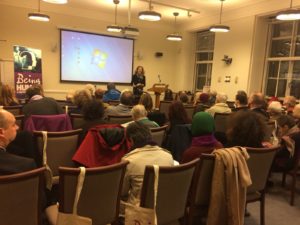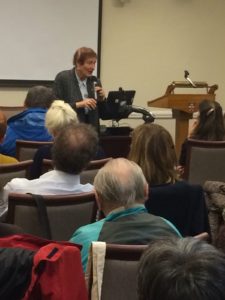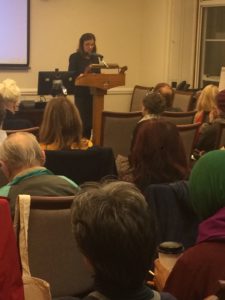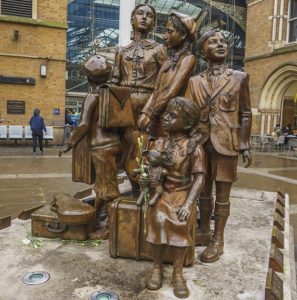Margaret May, MRes student at the IMLR, talks about the event held on 24 November on the Kindertransport
As part of the week-long, nationwide ‘Being Human’ Festival of the Humanities, the IMLR hosted an event at Senate House on 24 November on the topic of the Kindertransport, the British government-backed scheme to bring 10,000 unaccompanied minors from Nazi-occupied Europe to Britain in the nine months before the Second World War. The relevance of the subtitle of this event to the festival’s theme of ‘Lost and Found’ was immediately apparent; but what emerged clearly and movingly during the evening was that the issues surrounding this rescue are still as alive today as they were more than 75 years ago.
 Participants at this very well-attended event were able to interact with speakers who offered very different perspectives: the author, educator and psychotherapist Ruth Barnett, who came to Britain at the age of four on a Kindertransport from Berlin; German author Ursula Krechel, who based her award-winning novel Landgericht on archival material documenting Ruth’s family history; Dr Andrea Hammel (Aberystwyth University), whose academic expertise includes issues relating to the Kindertransport; and IMLR student Stephanie Homer, whose PhD thesis explores fictional representations of the Kindertransport in both literature and film.
Participants at this very well-attended event were able to interact with speakers who offered very different perspectives: the author, educator and psychotherapist Ruth Barnett, who came to Britain at the age of four on a Kindertransport from Berlin; German author Ursula Krechel, who based her award-winning novel Landgericht on archival material documenting Ruth’s family history; Dr Andrea Hammel (Aberystwyth University), whose academic expertise includes issues relating to the Kindertransport; and IMLR student Stephanie Homer, whose PhD thesis explores fictional representations of the Kindertransport in both literature and film.
Andrea Hammel started by dispelling some popular Kindertransport myths – for instance, not all the Kindertransportees identified as Jewish, and the British government provided no funds for the rescue operation, or for continuing care – and then outlined some of the debates and controversies surrounding both the operation itself and its possible instrumentalisation in later commemorations.
However, anyone who might still have doubted the relevance of the Kindertransport today would surely have been convinced by Ruth Barnett’s passionate plea for the constant need to combat human indifference – which, like Elie Wiesel, she described as the real enemy, a far more potent threat to attempts to eliminate genocide than racism itself. Although she briefly narrated her personal history she was more concerned to draw attention to the cause of refugees and oppressed minorities such as the Roma today, and her continuing work in schools and other groups. Having already published several books, including her autobiographical Person of No Nationality: A Story of Childhood Loss and Recovery, Ruth disarmingly mentioned that after a chance conversation with her son she just decided to write a play (which took her ‘about three weeks’) drawing on the life and destroyed career of her own father, a Berlin judge. The fact that What Price Justice? will be premiered in Liverpool next May testifies to her remarkable energy and determination.
The presentations by Ursula Krechel and Stephanie Homer highlighted the distinction between the concerns of the novelist and those of the filmmaker (in this case through an excerpt from the two-part German TV adaptation of Landgericht). While Ursula felt it was crucial for her novel to convey failures of communication in the family as a result of the lack of shared experience caused by the wartime separation (which Ruth herself also touched on), Stephanie explained why this was not something that was suited to the medium of film. Different ways of approaching the subject were also discussed: Ursula remarked that there were eight versions of the film script, whereas she produced only one version of her novel, after years of careful research. The approach taken in the memoir and the novel differed considerably too: Ruth’s book follows a strict narrative sequence, while Ursula’s starts with the postwar situation – a less persuasive ‘new life found’ – focusing on the moral dilemmas involved in Ruth’s father’s struggle with bureaucracy for justice, restitution and recognition (reflected in the dry, even harsh, language of the official correspondence on both sides), with the events of the Kindertransport narrated in flashback. Ursula also explained why her novel transposes his life in exile to Cuba, although in reality he escaped to Shanghai, like many other stateless persons at that time.
This event brought together three worlds in a dynamic exchange. As Ruth pointed out, there is always more to be said about the Kindertransport, however many memoirs have been published, and her next book will address the difficult life of her brother, which she felt had not received the attention and appreciation it deserved. Tellingly, she contrasted the two Kindertransport memorial sculptures by Frank Meisler, himself another Kindertransportee: the one at Liverpool Street station celebrates the British role in the rescue operation and conveys an essentially optimistic message; the one at the Friedrichstrasse station in Berlin points both ways – depicting children about to embark on Trains to Death and Trains to Life – and Ruth spoke poignantly of her sense of humility in the face of the destruction of so much potential talent and achievement. One important task of academic research is to quantify that loss, to record the facts of the struggles against indifference and incomprehension, to compare, to draw lessons. But beyond this, the event invited us to reflect on the power of literary fiction and film to create empathy and expand our imagination, applying it to other situations we encounter, as well as to consider the relationship between truth and reality, and the significance of commemoration and memorialisation to succeeding generations. And above all, it encouraged us to think about what ‘being human’ really means.
Margaret May, MRes student, IMLR




